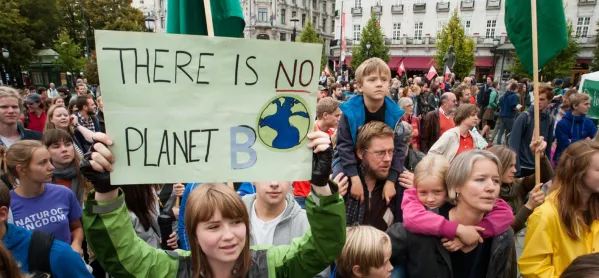- Home
- 6 ways to bring climate change to the curriculum
6 ways to bring climate change to the curriculum

The climate change protests that swept the world last year, kickstarted by Swedish teenager Greta Thunberg, generated huge amounts of coverage and showed that this generation is deeply aware of the ongoing climate crisis.
The roots of this modern environmental movement can be traced back though as far as the 1960s with Rachel Carson’s book, Silent Spring. It grew rapidly as the loss of species and habitats, and the dangers of pollution, became clearer.
Read more: Teaching the truth of natural disasters
Opinion: How (and why) I became a climate change teacher
News: John McDonnell urges students to act on climate change
Such environmental concerns gave rise to a range of education initiatives, including innovative exam courses at 16 and 18.
Some say that the 1970s were a golden age for environmental education before the national curriculum killed the innovations off, in English schools at least.
However, NGOs such as the Wildlife Trusts, the RSPB, and many others, continue to provide much needed community-based environmental education programmes for all ages.
Ongoing losses
Since then the environmental threat has only got worse now, whether we think of the demise of songbirds in the UK countryside, the global loss of fish stocks, or the threat to iconic creatures such as tigers, orangutan, and rhino.
We also have the effects of global heating and rapid climate change to add to the challenges we face. Clearly young people are worried about all this, hence the widespread protests last year.
Despite this, the Department for Education has never really agreed that environmental issues should have a strong focus in the school curriculum. The DfE is still reluctant although it points out – rightly – that national curriculum programmes do contain some environmental topics, such as climate in geography.
A dedicated focus
That may be so, critics say, but climate change as a distinct topic needs to have a dedicated focus on school curricula.
Within the UK there’s a highly effective student climate network (UKSCN) that is pushing for this, while recent data from a recent NUS students' union survey found 85% of school students think schools and colleges should be encouraging and helping pupils to do things to help the environment.
Furthermore, in the same survey, 89% of school staff said students should be taught about climate change, its implications for environments and societies around the world, and how these implications can be addressed.
But the government seems to be standing firm.
Teach the Future
So working with the NUS sustainability education charity SOS-UK and others, the UKSCN has formed Teach the Future, which bills itself as ‘a youth-led campaign to urgently repurpose the entire education system around the climate emergency and ecological crisis’.
Its purpose is to encourage the government to help ensure that young people in schools learn about the predicament we are all in, and what we might do about it.
It has six fundamental goals it believes can help accomplish this:
1. A government-commissioned and independent review into how the whole of the English formal education system is preparing students for the climate emergency and ecological crisis – in terms of knowledge, skills, attitudes and competencies.
2. The inclusion of the climate emergency and ecological crisis in teacher training – and a new professional teaching qualification.
3. An English Climate Emergency Education Act – including funding for teacher professional development and the creation and dissemination of teaching materials.
4. A national Climate Emergency Youth Voice grant fund – to help establish youth advisory panels in education providers and public bodies.
5. A national Youth Climate and Ecological Endowment Fund – to support youth environmental social action in every school, college and university.
6. Changes to regulations to ensure all new state-funded educational buildings are net-zero carbon from 2022 – and all existing state-funded educational buildings are retrofitted to net-zero carbon by 2030.
With the support of the main environmental charities and teaching unions Teach the Future is holding a parliamentary reception on Wednesday, February 26 to encourage MPs and the government to help young people to learn about the climate emergency and ecological crisis, and how these will affect their futures.
The hope is that with young people leading this initiative and the clear focus it has on what they want to happen, MPs will listen - and act. As someone who has been watching how environmental issues have been covered in schools since the 1970s, it’s very encouraging to see.
So here's to Teach the Future. Let's hope we do.
Keep reading for just £1 per month
You've reached your limit of free articles this month. Subscribe for £1 per month for three months and get:
- Unlimited access to all Tes magazine content
- Exclusive subscriber-only stories
- Award-winning email newsletters